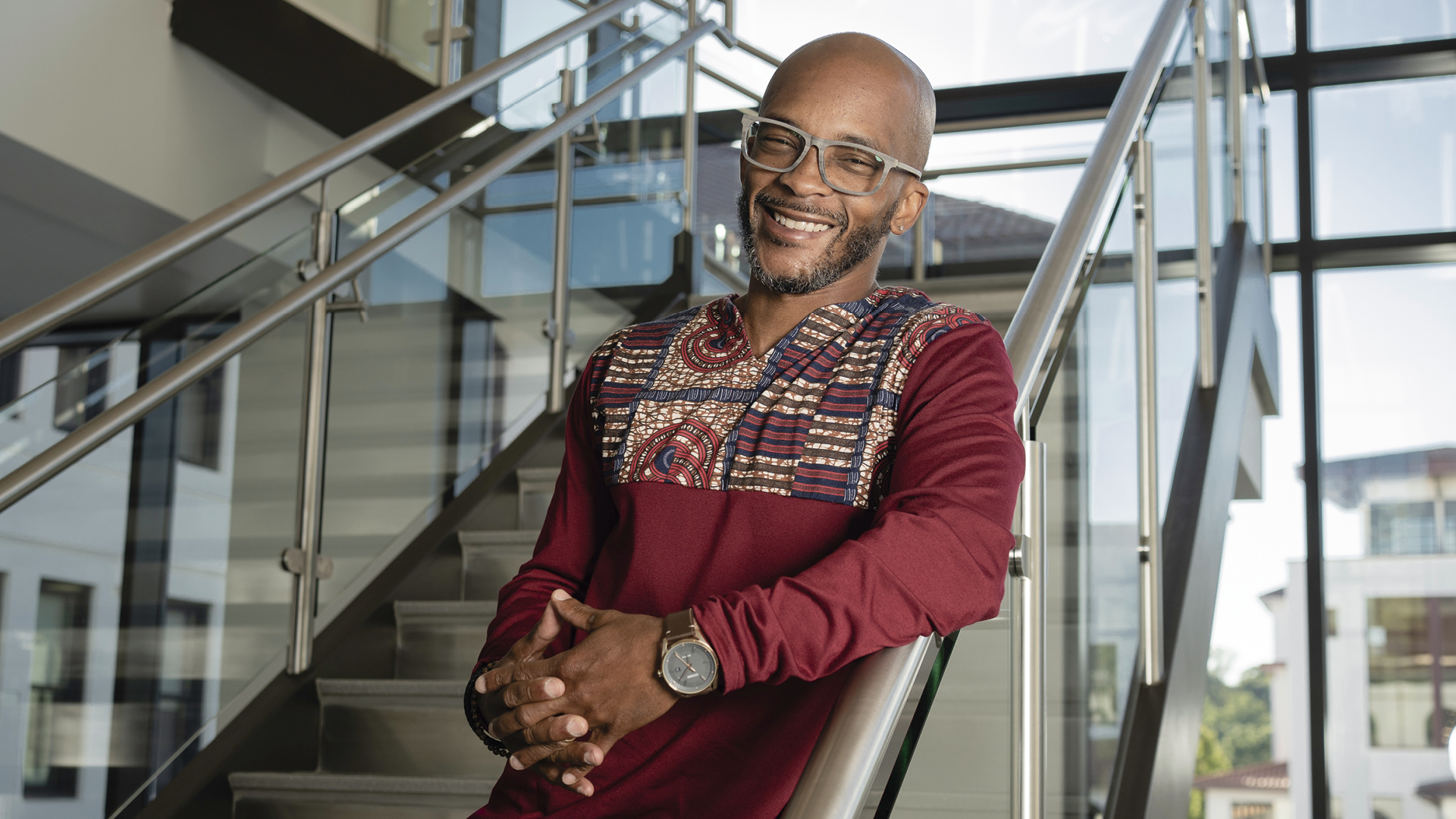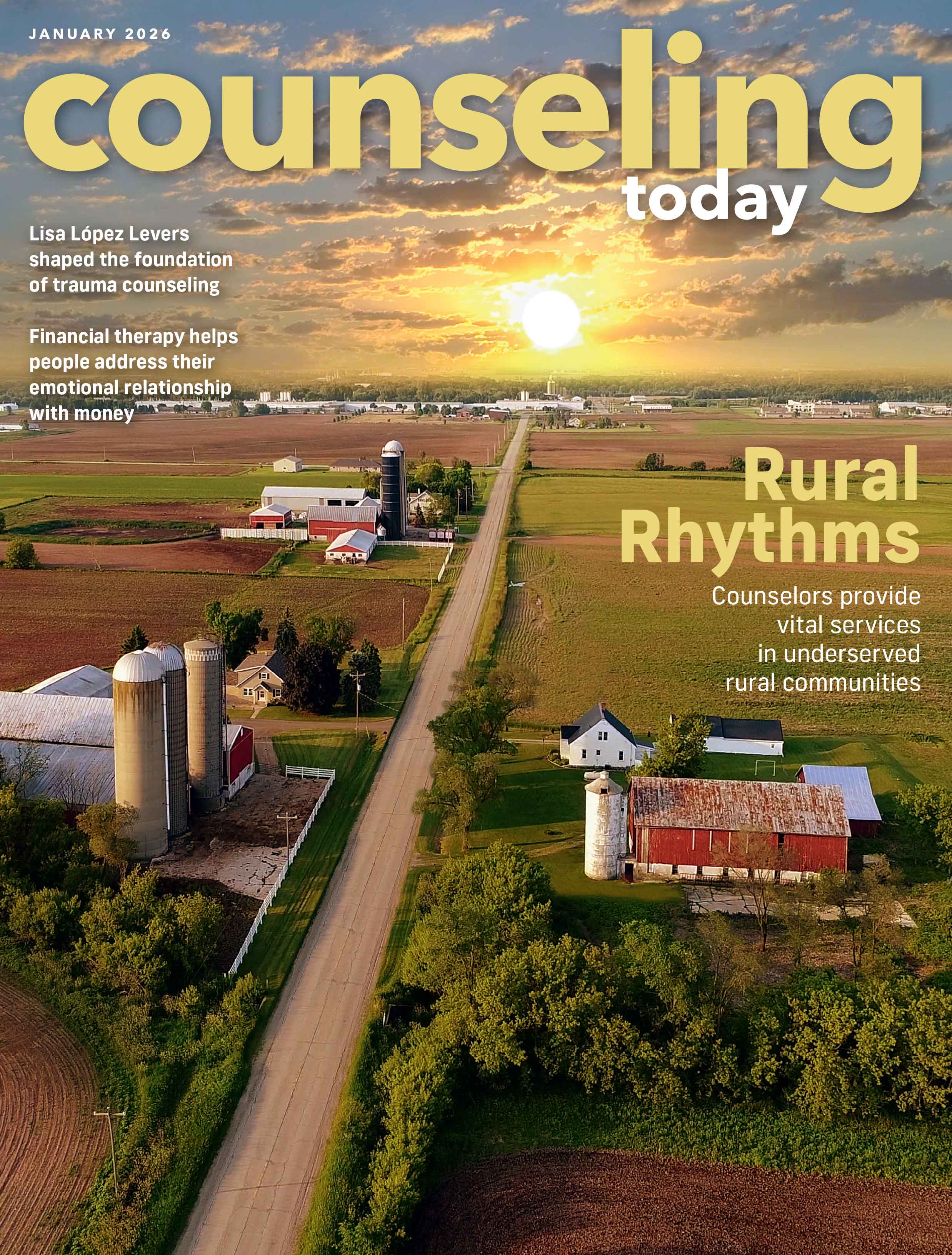Strength of a Father
By Jennifer Fink
November 2025

One word — autism — changed this father’s life. Michael D. Hannon, PhD, LPC, NCC, was working as a school counselor when his second child, a boy named Avery, was officially diagnosed with pervasive developmental disorder-not otherwise specified, a diagnosis then given to people who exhibited symptoms of autism.
At 21 months old, Avery spoke only a few words; his language and development were noticeably different from his older sister’s, at least in the eyes of their mother, Michael’s wife, LaChan. “I grieved as if I lost a loved one,” Hannon wrote in a journal article. “I knew nothing about autism. Nothing … I was operating from a deficit orientation, influenced by stereotypes, gendered expectations for my son.” Panic, fear and worry co-existed beside his grief.
Hannon knew his fatherhood journey would differ from what he’d expected. He knew Avery would need additional support. And he very quickly realized he and his family faced additional barriers. Although he and his wife both worked in K-12 education — and “spoke the language of schools and services,” he says — they still had a tough time getting Avery the care and services he deserved.
“I thought, ‘If we're having such a tough time fighting with folks, what does that mean for folks who don’t have the privileges we have?’” Hannon says.
That question set him on a new professional trajectory. Today, Hannon describes himself as a Black man, husband and father who also happens to be a counselor, professor and author. He is an associate professor at Montclair State University in New Jersey and an unapologetic advocate for the well-being of Black fathers and father figures, particularly those parenting autistic people.
Finding Purpose
Hannon began his career in higher education, working in student affairs. He was assistant director of the Paul Robeson Cultural Center at Penn State and then director of student activities at Delaware State University before pivoting to school counseling.
Before autism entered his experience, Hannon planned to eventually earn a terminal degree. “I imagined myself being a dean of students or vice president for student life,” he says. “But life awakened another set of curiosities.”
After Avery’s diagnosis, and with his family’s support, Hannon returned to Penn State to pursue a PhD in counselor education and supervision. “I went into my doctoral studies fairly clear that I wanted to study the psychosocial aspects of autism in Black families,” Hannon says. A conversation with his dissertation chair, Richard Hazler, PhD — a fellow father who had earned his doctoral degree while parenting — led Hannon to his current focus.
“He told me, ‘You need to ask some questions about fathers,’” Hannon remembers. “From that point on, I began to be really curious about Black fathers’ experiences with autism.”
It was 2013, and at the time, most fatherhood research was coming from the fields of human development or family studies. Nothing in the counseling space was focused on dads, even though fatherhood dramatically affects an individual’s mental health and sense of self. Little to no research looked at how an autism diagnosis in the family affected fathers, even though parents of children with autism spectrum disorder generally report higher levels of stress than parents raising neurotypical children.
Hannon decided to focus his research on Black fathers of autistic people. He interviewed six African American fathers of autistic children; the fathers ranged in age from 38 to 54 and the children from age five to age 22. All but one of the children were boys. When Hannon’s dissertation, “Love Him and Everything Else Will Fall into Place: An Analysis of Narratives of African-American Fathers of Children with Autism Spectrum Disorder,” was published in 2013, it was the first and only study of Black fathers of autistic people.
Fathering While Black
Black fathers in the U.S. are as involved with their children — and in many cases, more involved — than fathers of other racial and ethnic backgrounds, Hannon says. But as his research makes clear, Black fathers are often overlooked, ignored and hindered by racism.
Hannon realized his “invisible status” during a contentious Individualized Education Program (IEP) meeting with his son’s school. He and his wife wanted to maintain their son’s educational supports and accommodations to facilitate Avery’s continued success; the school wanted to decrease services. Despite the Hannons’ objections and reasoning, school staff forged ahead with their plan — eventually changing Avery’s IEP without the family’s consent.
The fact that Hannon was a concerned father of the student they were making decisions for was insufficient to create change. School staff were unmoved by the fact that he was a Black father worried about his Black son’s academic and social trajectory, he says. Reminding staff that he and his wife were both academic professionals who knew special education policy and their rights was “almost enough,” Hannon says. Yet ultimately, the school acted only when the Hannons threatened to file an ethical complaint. That, Hannon says, “is when we were finally acknowledged as visible.”
Their experience is not unique.
In Hannon’s dissertation, he asked the Black fathers he interviewed what words of wisdom they would share with a father whose child was newly identified as autistic. One dad explicitly said what the others alluded to: “This would be a different conversation with an African American dad versus a dad who was not African American.”
Black fathers and Black children with autism continue to face difficulty getting the services they need. Black and brown children with autism are more likely to be diagnosed with co-existing disorders such as oppositional defiance disorder, while white children with similar symptoms are more likely to be solely identified as autistic, Hannon says. And as Hannon notes, “The level of sensitivity and empathy expressed to a child who is solely diagnosed as autistic is very different.”
Centering Fathers and Building Community
Since 2019, Hannon has co-led a support group for fathers of autistic children. Sponsored by the A.J. Drexel Autism Institute, the group started in person and now meets virtually every month between September and June. The group is racially, ethnically and geographically diverse and does not shy away from discussing the joys and challenges of parenting children with autism or fathering while Black.
Dads often need and want more information about a child’s diagnosis and prognosis, and one question Black fathers in particular wrestle with is, “To whom can I talk about this safely without fear of being marginalized or being pushed to the side?” Hannon says.
That’s why Hannon’s work centers Black fathers’ concerns and experiences. He has published many papers about fatherhood, race and autism, including papers about culturally responsive support for Black and Latinx fathers of children with autism, Black fathers’ experiences with school-based family counseling, and the impact of “otherfathering” — serving as a parental figure for children they are not biologically related to — on Black men’s mental health. He’s also presented his research around the world, raising awareness of Black men’s experiences as parents and encouraging counselors to recognize fathering in all its forms.
Hannon edited the first book about Black dads and mental health, Black Fathering and Mental Health, published in 2022. He is working on his second book, Protect, Provide, Prepare: Black Fatherhood Code in Family and Community.
Protect, Provide and Prepare
Increasingly, the counseling profession recognizes that fatherhood has a profound impact on men’s mental health — and that helping Black fathers requires understanding what parenting means to them. Hannon’s latest project explores what he calls the three Ps of fatherhood, which is a riff on anthropologist David Gilmore’s three Ps of manhood:
- Protect. Physical protection of their children has long been a baseline expectation of fathers. Black fathers also care about protecting their children’s emotional safety and are determined to protect their kids’ Black joy, Hannon says.
- Provide. “We’ve begun to resist narrow conceptions of fatherhood,” Hannon says. “We provide for our kids emotionally, as well.” Black fathers also deliberately provide opportunities for racial and cultural well-being for their children.
- Prepare. Black dads feel a great responsibility to prepare their children to succeed in a world that’s not necessarily designed for them, Hannon says. And they are preparing the world to accept and celebrate their children’s Black joy.
Fathers are doing the work and finding great joy and meaning in parenting. Counselors and the counseling profession must now step up and support them, Hannon says. He has already lost some research funding due to federal cuts and de-prioritization of diversity, equity and inclusion.
“We’re literally seeing what white supremacy looks like in real time,” Hannon says. “We know the historical and contemporary implications of these kinds of measures — the erasure of people and contributions, the whitewashing of history. There are voices being silenced due to a desire to discredit the merit of their contribution.”
Counselors, he says, must continue to advocate for clients. “We’re seeing the Health and Human Services secretary say that autism is an epidemic while the reality of reductions in Medicaid funding will make it difficult for many people to access or sustain health care for their families,” Hannon says.
He encourages individual counselors and the profession at large to make their voices heard at the local, state and federal levels. It is time, he says, to be brave, honest and subversive if necessary. “We must continue to publish research and share the things we’re learning from our clients,” Hannon says.


